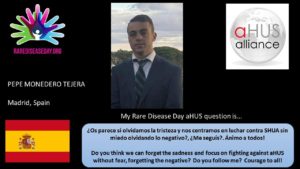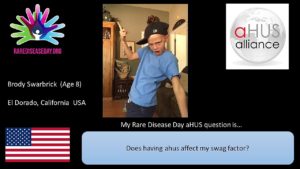Two questions in the Rare Disease Day video address the same issue but from different perspectives.

Pepe of Madrid Spain asks
“Do you think we can forget the sadness and focus on the fighting against aHUS without fear targeting the negative ? ( Courage to all)
and Brody of El Dorado California USA asks

” Does having aHUS affect my swag factor?”
The Psychological impact of living with a chronic illness is a subject that is very much covered in clinical research. Studies usually approach it by either measuring patients levels of depression ( or sadness) or self esteem ( or swag!) . Some of those studies relate to the effects on those living with kidney failure, where a marked loss of control of life can impact on patients’ feelings of depression and low self esteem.
As far as the aHUS alliance can find, there has been no such specific study of patients with aHUS, whether those patients have needed life time dialysis/transplant or not.
There is no doubt that for aHUS patients that first encounter with a serious life threatening illness is a shock. Their self confidence is adversely affected and patients, whether their encounter involves short or long term dialysis , take time to recover physical as well as psychological well being.
For studies which answer the questions for aHUS patients, data will need to be collected about what patients are feeling over time. Such data is usually collected by aHUS registries , like the Global aHUS Registry ( click here for more information) using Patient Reported Outcome questionnaires, which enrolled patients and carers complete during clinic visits to their hospital. The questions cover matters like fatigue and getting on with day to day activities, as well as measuring feelings of depression/self esteem ( if not specifically the “swag factor”).
The Global aHUS Registry has not published any research using this data as yet, but the Scientific Advisory Board of the Registry has approved a working group to look at fatigue scores in patients as they move away further in time from their catastrophic episode of aHUS.
Other data will be studied in time, so it is important that aHUS patients, who are enrolled in Registries, ensure that they complete the Patient Reported Outcomes questionnaires at regular intervals as it will help provide the aHUS answers to the questions that Pepe and Brody pose.
aHUS Patient organisations around the world have patient support as a core element of what they do . That support is usually aimed at helping patients help themselves because having more personal control itself begins recovery.
The only known video which addresses that recovery process was produced by the Foundation for aHUS for the 2014 Conference in Iowa, hence some it relates to US patients. Produced by the alliance’s Linda Burke it can be seen on the aHUS Clinical Channel on Youtube by clicking here.
Becoming personally engaged in their care is a step for patients towards regaining equilbrium in their lives ; and something that is shared with all those who are a part of global public patient engagement for aHUS in the social media, patient conferences etc. Pepe and Brody are now part of that :
#aHUSRockslives have #aHUSCourage be #aHUS Strong and regain #aHUS Swag

